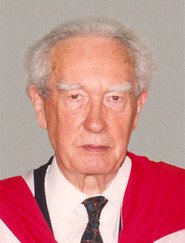
Derek Barton spends his time inventing new chemical reactions for use in the synthesis of biologically and economically important compounds. He believes that there is no reason for human beings to die prematurely as chemical compounds synthesised in laboratories using chemical reactions should and can provide remedies for diseases and disorder.
Born and educated in England, our distinguished chemist received two doctorates from Imperial College in the 1940s and was elected Fellow of the Royal Society in 1954. He became renowned for developing a theory to explain the reactions of highly complex organic molecules which included carbohydrates, alkaloids such as morphine, and steroids in particular.
This research on conformational analysis won him the Nobel Prize for Chemistry which he shared with the Norwegian chemist Odd Hassel in 1969. By this time, Derek Barton had become Professor of Organic Chemistry at Imperial College, and later Hoffman Professor of Organic Chemistry in 1976. Recognition of his achievements came from both the United Kingdom and overseas. He holds honorary doctorates from twenty-five institutions, including those from Colombia, Oxford, London and the Shanghai Institute of Organic Chemistry. In 1972, he was knighted by Her Majesty the Queen, who also conferred on him the Royal Medal in the same year.
Sir Derek’s greatness lies in his ability to tackle difficult chemical problems by devising new reactions and theories to transform molecules. Following his theory of phenol oxidative coupling he invented new radical chemistry in his work on nitrite photolysis, which led to a simple synthesis of the hormone, aldosterone. This became known as the Barton reaction.
And so one reaction followed another as the indefatigable Nobel Laureate maintained an extremely hectic pace in research based on sound organic and physical chemistry principles. But there is an exception to the rule. By chance, Derek Barton discovered a new photochemical reaction to break the carbon-oxygen bond in cholesterol. This came about because the student performing the experiment inadvertently left the flask of reactants exposed to sunlight on the bench while spending a long week end playing international bridge. This was the origin of Barton’s "game of bridge reaction".
Our eminent chemist remains first and foremost an academic. He lectures, supervises postgraduates and constantly breaks new ground in scientific research. He is a rare and inspiring role-model and sets high standards for his students. According to one chemist Vice-Chancellor, a PhD student literally fainted on hearing that Derek Barton was appointed as his external examiner. Over the decades, his students go through a rigorous process of having to respond to the following question ever week: What did you do last week? What conclusions can you draw from your findings? What is your plan for next week? Out of this relentless routine have emerged disciples who now hold chairs in Cambridge, Glasgow and Imperial College, to name a few.
Retirement from Imperial College in 1978 only set Derek Barton on a new trial in search of more inventions and discoveries as he became Director of the Institute for the Chemistry of Natural Substance in Gif-sur-Yvette in France. He was subsequently appointed Distinguished Professor at Texas A and M University, a post he currently holds. In recent years, Professor Barton has started a series of new investigations into the use of radicals in synthesis and his methodologies have inspired others to apply his ideas to demonstrate the synthetic potential and generality of radical chemistry. In particular, his reductive decarboxylation and radical deoxygenation reactions have wide applications in synthesis. Recognition of his achievements continue to come his way. He won the Copley Medal of the Royal Society in 1980, and was made Officier de la Legion d’Honneur and Honorary Fellow of the Royal Society of Chemistry in 1985. It has been said on the occasion of Sir Derek’s seventy-fifth birthday that "his love for chemistry is that of the artist who continues to be enthralled by beautiful landscapes".
Mr Chancellor, for his gargantuan contribution to science and his total dedication to academe, I commend to you Derek Harold Richard Barton, for the award of the degree of Doctor of Science honoris causa.
Citation written and delivered by Professor Lee Ngok, the Public Orator.




